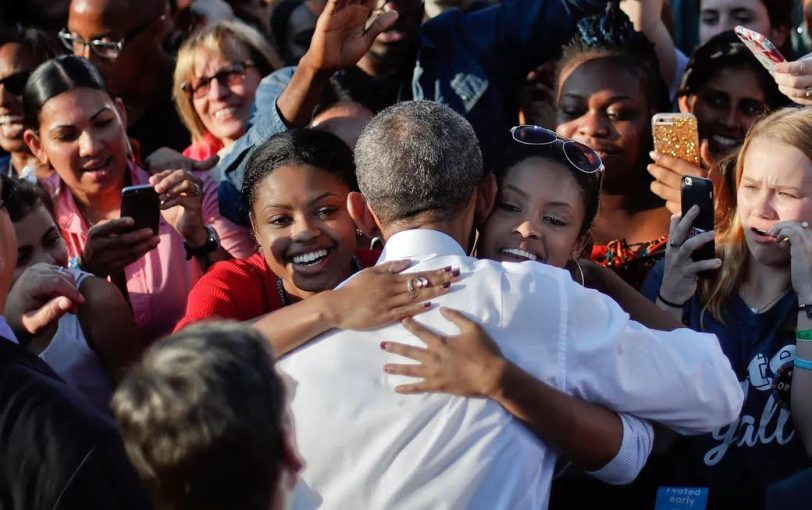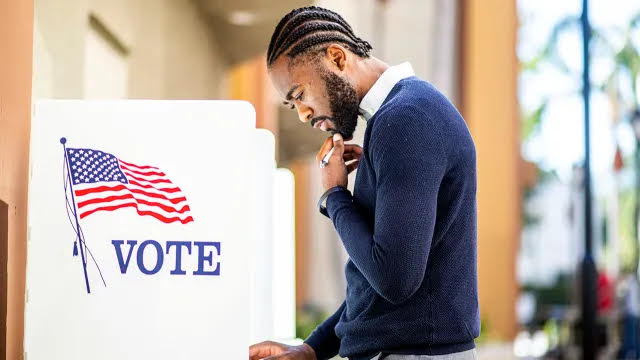The power of the Black vote

BY NADIRA JAMERSON
You’ve probably seen the headlines calling the November 5, 2024, presidential election the “most important election of our time.” Maybe you’ve heard that about previous bids for the White House, but this year, it’s all too true. With the Supreme Court overturning landmark legislation spanning from reproductive rights to Affirmative Action, Black history being banned in schools, and police brutality at a high, many Black Americans rightfully worry what the future of the nation will look like—and if they will be safe in it.
The question on many Black folks’ minds has become: what can we, our families, and our communities do to protect our interests and ensure that we have a say in the direction of this country?
Answers may lie in the timeless words of civil rights activist and former U.S. Rep. John Lewis who once said, “The vote is the most powerful nonviolent change agent you have in a democratic society. You must use it because it is not guaranteed. You can lose it.”
Indeed, history illustrates that when Black Americans know how to leverage the power of the Black vote, they can create meaningful change.
The history of the Black vote

In 1870, the U.S. Congress voted to ratify the 15th Amendment, which declared that states could not deny the right to vote “on account of race, color, or previous condition of servitude.” Within a year, 450,000 Southern Blacks registered to vote. Since then, Black Americans have been a powerful influence in local, state, and federal elections.
More recently, Black people have fought and won to get presidents from Bill Clinton to Barack Obama and Joe Biden into the White House.
In “A Historic Moment: Black Voters and the 1992 Presidential Race,” scholar Clarence Lusane chronicles how polling ahead of Clinton’s 1993-2001 term expected the former president to lose against Republican nominee Bob Dole. Roper Center, Cornell University’s archive of social science data, later reported that the close race was only won because Clinton secured a majority — 83% — of Black voters. Similarly, according to Pew Research, the 2008 U.S. presidential election saw the most racially and ethnically diverse voter turnout in U.S. history. For the first time, Black women had the highest voter turnout rate of any racial, ethnic, and gender group, effectively winning Obama his position as the first Black president of the country. And current President Joe Biden would not have his position in the White House without the Black voters who showed up to ensure that he beat Donald Trump in 2020. Black voters remained overwhelmingly loyal to the Democratic Party, voting 92%-8% in favor of Biden.
In light of this tremendous impact, the rest of America has been waking up to the importance of the Black vote, which has led to major opposition from those who seek to maintain a white supremacist status quo. Since the election of President Barack Obama, states nationwide have passed laws that place new restrictions on voting rights. Measures including the introduction of voter ID requirements and limits on early voting have disproportionately impacted Black Americans. In 2013, the Supreme Court also struck down key parts of the 1965 Voting Rights Act as unconstitutional in the case of Shelby County v. Holder.
“Let’s be clear: Voter suppression is real,” said politician, lawyer, voting rights activist, and former Georgia House Rep. Stacy Abrams. “From making it harder to register and stay on the rolls to moving and closing polling places to rejecting lawful ballots, we can no longer ignore these threats to democracy.”
Why the Black vote matters today

The number of eligible Black voters in the U.S. is projected to reach 34.4 million by the 2024 presidential election, Pew Research reports. Additionally, in Georgia, a closely watched swing state, Black Americans account for a powerful third of eligible voters.
Some 12% of Black eligible voters are expected to vote Republican in the upcoming election. A small percentage compared to the whopping 70% that are expected to vote Democratic, according to recent surveys. To create the illusion that a larger percentage of Black voters are likely to vote Republican, the party’s nominee, Donald Trump, often packs Black faces behind him for the television to show during his rallies. To convey the same false impression, during the 2024 Republican National Convention in Milwaukee, U.S. Sen. Tim Scott of South Carolina told the Republican audience that they are not alone. “There are thousands, if not millions all around the country who believe like we believe, pray like we believe, do what we know that needs to be done. If we keep doing, the people will follow.”

Ignited by a collective want to stop Republican nominee Donald Trump’s racist agenda, Black Democrats, however, have already proven that they are willing to put in the work to elect Vice President Kamala Harris as the first Black woman president of the U.S. Word In Black, a national, Black-owned digital newsroom, reported on the more than 44,000 people—largely Black women—who showed up for a Zoom call to support Harris the day she announced her campaign in July. They raised more than $1.5M, kick-starting a record day of funding in just a few hours. Black men in government, including Maryland Governor Wes Moore, civil rights attorney Ben Crump, National Urban League President Marc Morial, and Congressional Black Caucus chair Steven Horsford, have all shown public support for the VP. A call hosted by Black Church PAC also saw over 16,000 Black faith leaders and other attendees unite in support of Harris for president.
“Where you see wrong or inequality or injustice, speak out, because this is your country. This is your democracy. Make it. Protect it. Pass it on,” said Associate Justice of the U.S. Supreme Court Thurgood Marshall in a 1978 commencement speech at the University of Virginia. By getting out to vote this November, that’s what Black folks can have the power to do.

